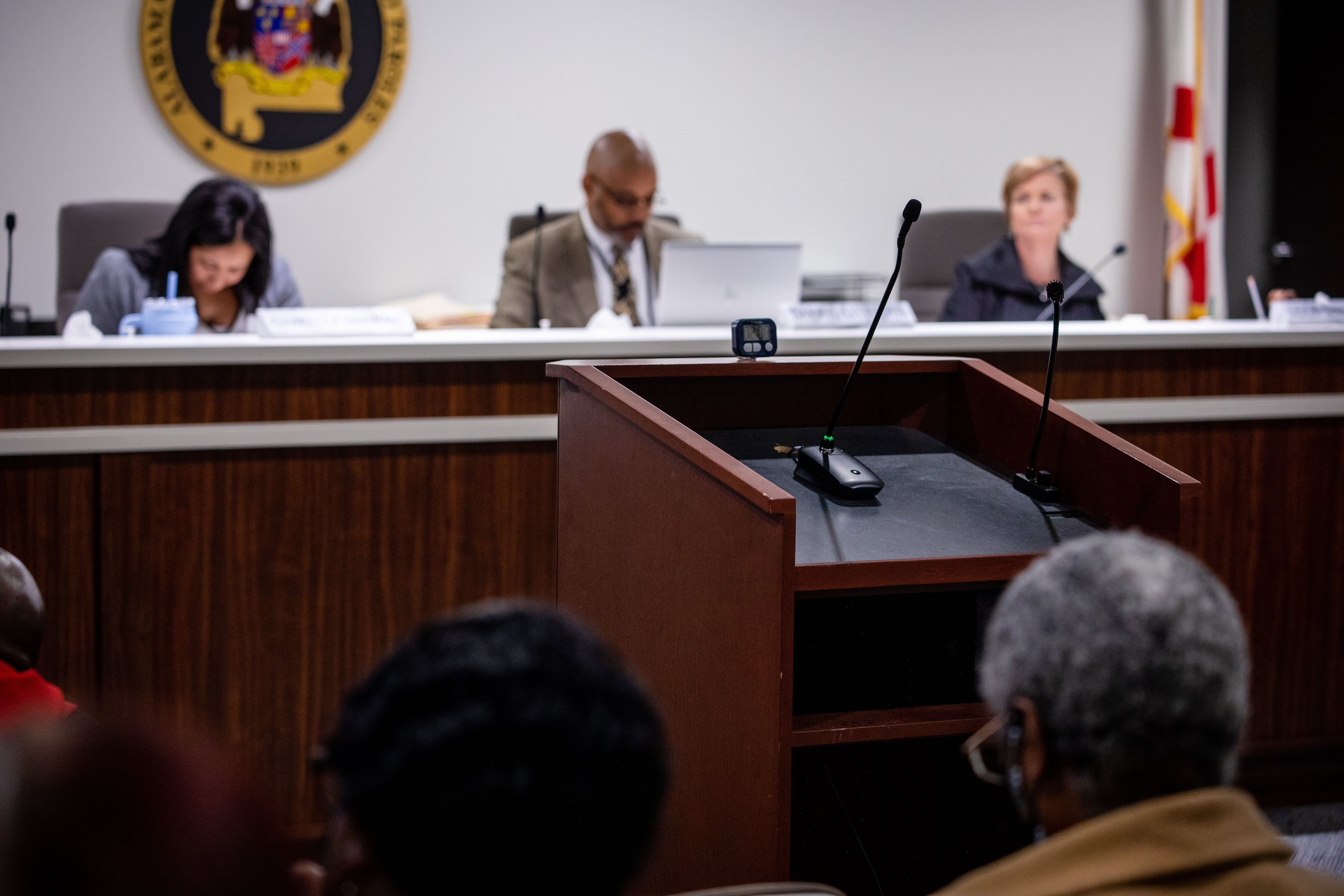Roy Moore regretted sending her to prison for life. Now Alabama wonât let her out on parole.
Stacy Shadwrick hasn’t had any disciplinaries during this stint in prison. She’s completed her classes and she’s on work release. But the 53-year-old is stuck in an Alabama prison, unable to get back out on parole despite an appeal for leniency from the prominent judge who sentenced her.
In 1993, Roy Moore, who was an Etowah County Circuit Judge at the time, handed down a life sentence for Shadwrick for a gas station robbery. But shortly after, he took the unusual step to write the Alabama parole board on Shadwrick’s behalf.
“Her sentence was especially harsh due to the Habitual Felony Law and I regret not being able to show more leniency under the circumstances,” Moore wrote in a letter to the parole board in the 90s.
During an interview with AL.com, Shadwrick said she was addicted to drugs most of her life. When she was 21 in 1991, she stole $146 from a convenience store in Rainbow City during an armed robbery. No one was injured.
Alabama Criminal Justice center at the Alabama Bureau of Pardons and Paroles in Montgomery, Alabama, January 9, 2024. Tamika Moore | AL.com
At 22, she pleaded guilty to second-degree robbery. Because of her past shoplifting convictions, Moore sentenced her to life in prison. He didn’t have a choice due to the state’s habitual offender laws at the time.
That was more than 31 years ago. And despite various parole boards giving her freedom over the decades and not thinking she’s a threat to the public, this board won’t budge to let her out of the state’s overcrowded prisons.
As recently as five years ago, Shadwrick would have had a good shot at being paroled. Alabama used to parole most prisoners, granting parole for more than half of those who were eligible in 2017 and 2018. But not anymore.
Last year, the Alabama parole board — under new leadership — denied more than 9 out of 10 inmates who came up for parole.
The last time she was out on parole, Shadwrick said, she messed up. She was sent back to prison after she was caught with $10 worth of meth and a pipe. The court sentenced her to a few months in prison followed by probation — but it didn’t matter, not really. She was back in the system.
Her short sentence for possession ended. Time served.
But Shadwrick has been in prison ever since.
She’s had her case before the parole board twice in the last five years, most recently in 2022. Each time she was denied. And this time, the board pushed her off for five years to wait for another hearing.
“I’m doing everything I’m supposed to do,” Shadwrick said. “I would think they would want me to complete all the programs, which I’ve done.”
From a prison phone, Shadwrick told AL.com that her problems trace back to drug addiction. She described an abusive father and alcoholic mother, and said, when she was 11, she found her mother dead. That’s when, according to Shadwrick, she started running away from home and using drugs like “T’s and blues.”
It’s that addiction that she said has messed up her chances at parole before. She’s been paroled a few times since that 1993 conviction, she said, before getting sent back to prison on revocations for missing a drug test or shoplifting from Walmart or not reporting to her parole officer. Court records show her last felony was in 2003, when she walked off her work release job. She came back a few hours later.
Each time, she was sent back to prison to continue serving her original life sentence.

The podium where supporters speak at the Alabama Bureau of Pardons and Paroles in Montgomery, Alabama, January 9, 2024. Tamika Moore | AL.com
Shadwrick, like others sentenced under the old three-strikes law, is set to be monitored for the rest of her life. That means, anytime she is paroled, she’s liable to serve out that life sentence for any technical misstep, whether or not criminal charges come from it.
Jefferson County Circuit Judge David Carpenter said judges are supposed to be able to decide how much mercy someone deserves and how much punishment is fair.
“The reason you have judges is to make a judgment,” he said. “Is this someone who should be going to prison for the rest of their life?”
Carpenter said people sentenced under Alabama’s old habitual offender laws should be resentenced under today’s guidelines.
“They need to be able to put this behind them once and for all like anyone else who has served their time,” said the judge. “And you can’t do that if you always have the looming threat of being sent back to prison for life for a minor charge or no charge at all.”
Last year, women were paroled at a higher rate than men. About 20% of those who had a hearing were granted, compared to about 7% of men.
Shadwrick has been at Columbiana’s Alabama Therapeutic Education Facility — a facility for inmates who have demonstrated they aren’t a danger to others.
She just went back to work release.
Shadwrick mailed copies of certificates of programs she’s completed, ending with her cosmetology certificate. She also earned the prison’s award for “the most pleasant personality,” a paper she folded delicately and enclosed in a letter to AL.com.
“What else do they want from me?”
Stacy Shadwrick, who was denied parole
If Shadwrick can find her way out of Alabama’s penal system, she’s determined to stay clean.
When asked why this time is different, she sighed. She’s only in her 50s, but Shadwrick said that when she looks in the prison bathroom mirror, she sees an old woman.
“I’m too old for this,” she said. “I can’t do this anymore. My kids and my grandkids miss me and they need me.”
“Even though I’ve done everything they want me to do, and I’ve been in no trouble…. What else do they want from me?”
This project was completed with the support of a grant from Columbia University’s Ira A. Lipman Center for Journalism and Civil and Human Rights in conjunction with Arnold Ventures.
